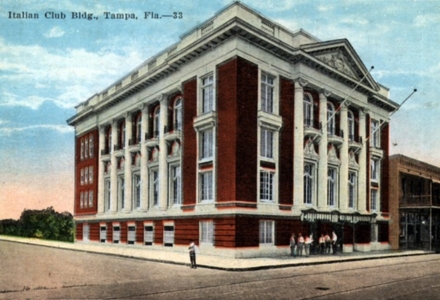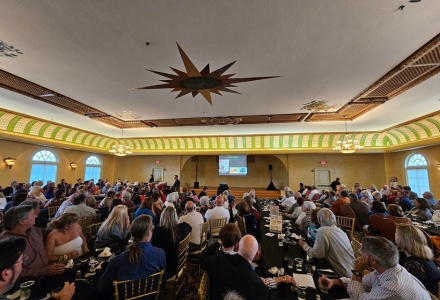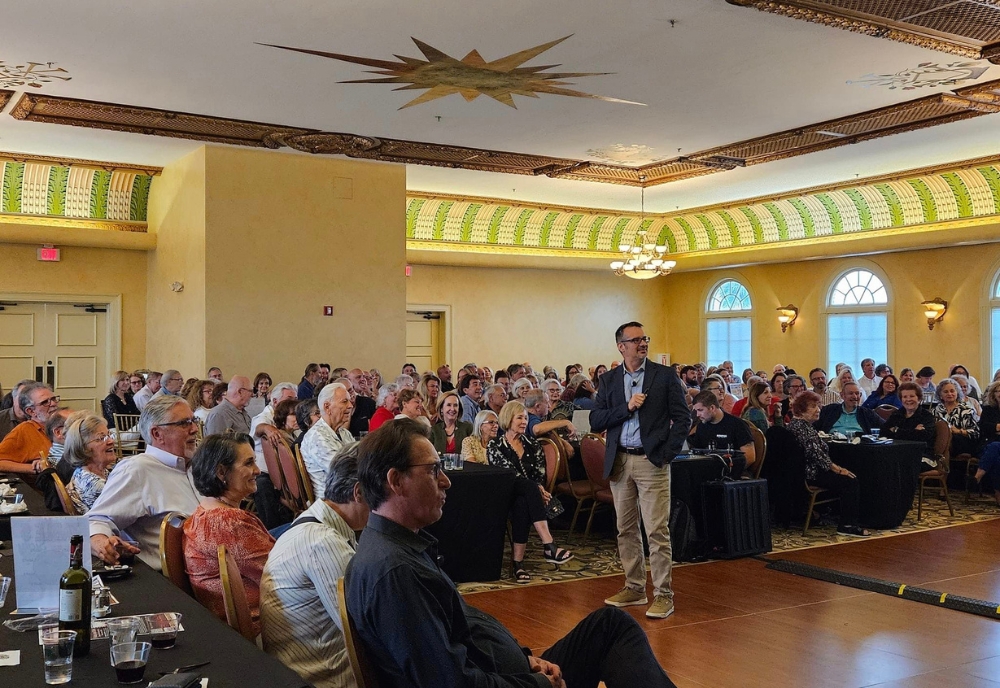
A postcard of The Italian Club building, circa 1910s. (Photo by Hampton Dunn Collection of Florida Postcards, USF Digital Commons)
Dr. Davide Tanasi, a professor in the Department of History and the director of the College of Arts and Sciences’ Institute of Digital Exploration (IDEx), presented a three-part lecture series on his research into ancient Sicily at The Italian Club of Tampa located in Ybor City. The sold-out event sought to reinvigorate the cultural legacy of the club while fostering connections between the Italian American community and USF.
The Italian Club of Tampa was established to provide a space where Italian Americans could unite to navigate the social and economic challenges during the turn of the century. Today, its iconic building in Ybor City remains a hub for this community and others in the Tampa Bay area.
Tanasi specializes in the archaeology of ancient Sicily, utilizing cutting-edge scientific approaches like remote sensing and biomolecular chemistry to study material culture. During the lecture series, he shared his research in three key areas: the monumental legacy of Greek and Roman Sicily, the spectacle and entertainment in Roman Sicily, focusing on gladiatorial games, and the culinary traditions of Roman Sicily.
Initially motivated to organize the lecture series to energize the cultural offerings at the Italian Club, Tanasi also aimed to educate the Italian American community about their rich Sicilian heritage.
“Since the vast majority of the Italian Americans in Tampa have Sicilian ancestry, it became a great opportunity for me to build a bridge between them and the fascinating ancient history of the island. Considering that I have active research projects in Sicily and that USF students routinely join me for fieldwork, I thought that it would be beneficial for the community to know what USF does to highlight the history of Sicily and train students in becoming future experts in the field,” Tanasi said.
All three segments of the event were fully booked, drawing large audiences. This strong
turnout provided valuable insights for Tanasi, highlighting a desire for this community
to learn more about their heritage.
“The lectures were incredibly well attended, with 250 people in attendance at each
event. This proves first, that there is great interest and desire by this community
to know more about Sicily and its charming history. Secondly, the powerful 3D visuals
that I use in my presentations combined with my storytelling skills made the events
informative and entertaining. Lastly, the popularization of science, in this case
archaeology, is very attractive, as proven by the great success of certain historical
fiction and shows available on streaming services or at movie theaters,” Tanasi said.
This lecture series acted as a catalyst for bringing crucial research to a broader audience. Tanasi hopes that these events will help spread information that's typically not accessible to those outside the research field. He aims to foster connections and bridge gaps across different disciplines.
“Archaeology complements history as a sister discipline, filling in gaps that historical writings may not have mentioned. While history focuses on main characters and major events, archaeology studies the lives of ordinary men and women and the minor events of their lives. For example, one of the focal points of my project, the Greek city of Heloros, is barely mentioned in the ancient sources practically making it non-existent in history. But, after three years of work on that site, we uncovered a blossoming city sprawling over 15 acres with splendid temples, public buildings, massive fortification walls, and even a theater!” Tanasi explained.

Attendees observe Dr. Davide Tanasi during the three-part lecture series hosted at The Italian Club of Tampa. (Photo courtesy of Dr. Davide Tanasi)
Tanasi is currently the lead for IDEx’s two significant projects in remote sensing and digital archaeology: the Heloros Advanced Digital Exploration and Surveying, and the Archaeological Heritage in Late Antique and Byzantine Sicily focusing on digital archaeology at the UNESCO World Heritage site of the Roman Villa of Casale in Piazza Armerina.
Alongside his research endeavors, he is also the co-program director for the Spring Break Study Abroad Program, USF Sicily: History and Culture, offering students the chance to explore the social, political, and cultural dimensions of ancient Greece and Rome.
Reflecting on the success of this lecture series, Tanasi was invited again by the Italian Club to deliver another three-part lecture series this upcoming Fall. He hopes to explore other aspects of Sicilian archaeology and unveil the secrets of this historic region.
To learn more about Dr. Davide Tanasi’s work, visit the Institute of Digital Exploration.
